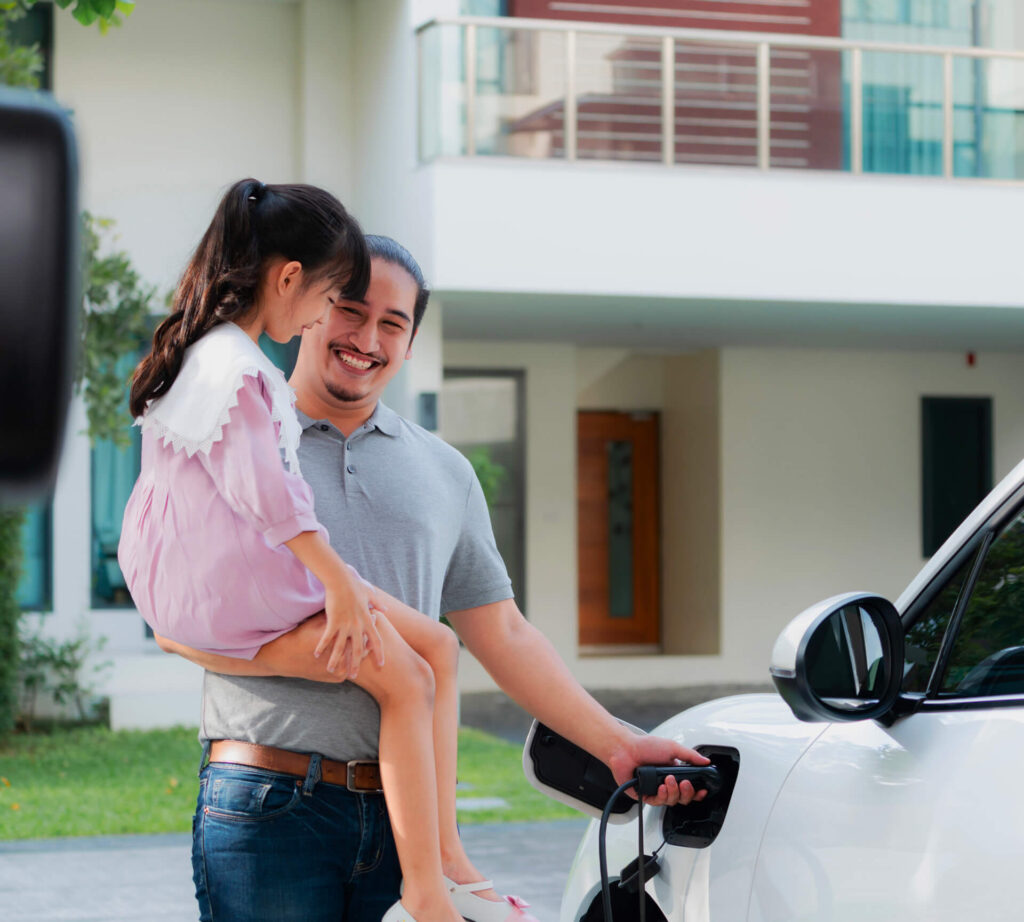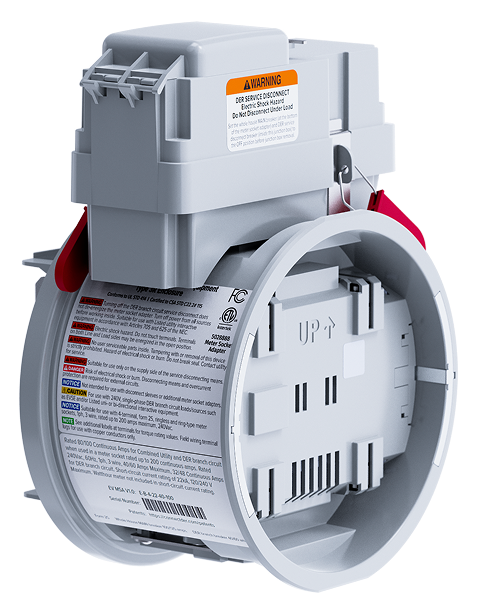EV METER SOCKET ADAPTER (MSA)
How Homeowners Save Thousands On EV Charger Installations
If you’ve been quoted an expensive electrical upgrade or main panel replacement just to install an EV charger at home, there’s a better way. ConnectDER’s EV Meter Socket Adapter (MSA) allows electricians to easily install EV chargers on homes and apartments with 100A/125A electric service, no upgrade required.

Avoid A Main Panel Replacement, Save Up To $4,550*
Without ConnectDER
Panel Replacement
$3,200
DRYWALL
$1,000
WIRING
$350
With ConnectDER
$0 Additional Electrical Work
Let us connect you to a preferred electrician in your area
"*" indicates required fields
By submitting, I agree to the Privacy Policy and consent to receive communications from ConnectDER about my request.
Affordable EV Charger Installations For 100A/125A Homes
One piece of equipment, thousands of dollars saved.

- Easily installs at your home's existing meter box
- Smart load sensing safely optimizes EV charging during peak demand from other appliances
- No main panel upgrade or service replacement needed
- Doesn’t take up a breaker spot
- Supports the most powerful Level 2, 48A EV chargers on the market
- Faster install for electricians, less interruption for homeowners
Approved By Major Utilities Across the U.S.
Arizona
- Arizona Public Service
- Tucson Electric Power
California
- Pacific Power
- Southern California Edison
Hawaii
- Hawaiian Electric
Idaho
- Rocky Mountain Power
Illinois
- Ameren
- Commonwealth Edison
Maryland
- Baltimore Gas & Electric
- Delmarva
- Pepco
- Potomac Edison
New Jersey
- Jersey Central Power & Light
Ohio
- Westerville Electric
Oregon
- Consumers Power Inc.
- Pacific Power
Utah
- Rocky Mountain Power
Vermont
- Green Mountain Power
Virginia
- Virginia Tech Electric
Washington
- Pacific Power
Wyoming
- Rocky Mountain Power
Not approved by your utility company? We work directly with major utilities and are constantly getting new approvals. Contact us to be the first to know when we’re available in your area.
Supports 48A EV Chargers For Powerful Performance
Future-proof engineering for modern chargers of today and tomorrow
Don’t Just Take Our Word For It
Will change the way we install home EV charging equipment

The EV MSA is a game changer
“I reached out to ConnectDER for help finding an electrician near me who could install an at-home charger using the EV MSA. I have 100-amp service and I definitely did not want to pay for a full upgrade. Their preferred installer got my charger setup in just a few hours! The EV MSA is a game changer.”
— Walter, Illinois Resident
“The pain and expense of getting your electrical panel rewired to connect an EV charger is eliminated”

“Plug-and-play meter collar makes electrical panel upgrades for EVs and solar unnecessary”
“EV owners conveniently charge their vehicles by connecting chargers directly through the meter socket”
Homeowner FAQs
The EV MSA combines multiple critical functionalities into one universally compatible device that makes it easier for electricians, and more affordable for homeowners, to hardwire an EV charger into the home, specifically for homes with 100A or 125A service. Components like a built-in circuit breaker, smart load sensing, automatic disconnect, and consumption monitoring minimize the amount of work an electrician must do, and in turn minimize the cost to homeowners. By taking the installation away from the main panel and to the existing utility meter on the exterior of your house, the EV MSA provides a plug-and-play connection point for the EV charger without an expensive main panel replacement or service upgrade. It also keeps the install outside your home, by avoiding the need to cut through drywall or ceiling to get to your main panel (more surprise costs!).
The EV MSA, and meter socket adapters in general, are installed between the meter socket and the utility billing meter on the exterior of a home. A licensed professional simply removes the utility billing meter, installs the EV MSA, then puts the utility meter back on. It only takes 15-30 minutes and does not damage your home in any way.
No. The EV MSA should only be installed by utility metering technicians or electricians licensed to work in the meter socket. The EV MSA is not a “DIY” device, but it does save homeowners significant time and cost on their EV charger installs!
Yes! We engineered the EV MSA specifically for 100A and 125A homes, which are common service amperages for homes built before 1980 and homes with smaller square footage. The EV MSA negates the need to replace your manel panel or upgrade your electrical service just to install an EV charger, saving you thousands of dollars. The EV MSA was not engineered for homes with 200A or higher electrical service, since those homes likely do not need additional panel or service work to install an EV charger.
Your EV charger can be installed in your garage. The EV MSA installs into your existing meter socket, at the utility meter box, which is often outside your home. However, your EV charger can be installed wherever you wish—the electrician would simply run wiring to hardwire your EV charger to the EV MSA.
Rewiring America estimates it can range from $5,000 to a whopping $25,000. It is highly variable based on your home’s existing electrical setup, the location of your meter box and panel, whether you need a main panel replacement or a full upgrade, and many other factors.
The EV MSA negates the need for a main panel replacement or electric service upgrade, which can range from $5,000 to $25,000 according to Rewiring America. It also makes for an easier install: For example, if your main panel is located in a finished basement and far from where you want your EV charger to be—the electrician would need to run complex wiring and likely cut through drywall or the ceiling inside your home, which adds time and cost, and may be intrusive to your life. The EV MSA avoids this by this by taking the installation away from the main panel and to the existing utility meter box on the exterior of your house.
Yes, the EV MSA will work with any brand of Level 2 EV charger rated up to 48A continuous. The EV chargers must 1) have a programmable max charge rate and 2) be hard-wired from the EV MSA; use of pluggable EV chargers is prohibited.
Nope! The EV MSA can support Level 2, 48A EV chargers without compromising performance.
The EV MSA monitors the whole-house load and uses control software to temporarily suspend power to the EV charging equipment when the whole-house current consumption reaches 80% or more of the service rating. For example, 80% of a 100-amp home is 80 amps. If your home relies heavily on electrical appliances, your EV may temporarily stop charging during times of peak power consumption, but the EV MSA automatically reconnects the charging equipment once consumption is lowered, and charging resumes.
Nope. If you have a 100A or 125A electric service, the EV MSA does not lessen your home’s overall power capacity. On the contrary, the EV MSA’s main benefit is that it allows you to install an energy-hungry EV charger without upgrading your service amps. The EV MSA has built-in load management and consumption optimization technology, which ensures you never max out your home’s capacity.
Nope. Nothing changes with how you’re billed for electricity from your utility company.
The EV MSA, like all of ConnectDER’s meter socket adapters, passes rigorous utility testing and safety review prior to being approved for installs in a utility territory. It’s tested and certified by Intertek/ETL, a nationally recognized testing laboratory under OSHA, to be safe and compliant with UL 414 standard and the National Electric Code (NEC). The EV MSA is also compliant with FCC regulations and CA Prop 65. The EV MSA is 3R rated to safely withstand outdoor weather conditions by the National Electrical Manufacturer’s Association (NEMA). All that is fancy talk for: It’s totally safe!
Reach out to us! We have preferred EV charger installation companies in all our approved utilities, so we can connect you with a highly-rated professional in your area.
*The savings shown are most reflective of EV charger installations that would have required a main panel replacement, and where the main panel is inside the home. The values provided are averages from a ConnectDER survey of over 50 installations. The installers had experience installing with and without meter socket adapters.